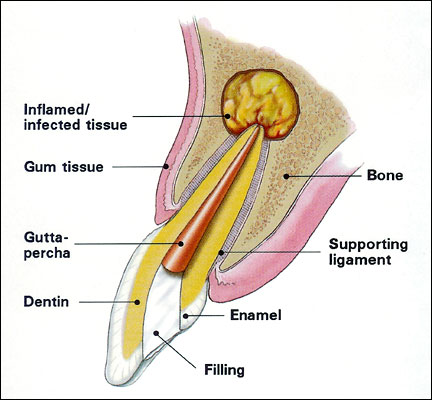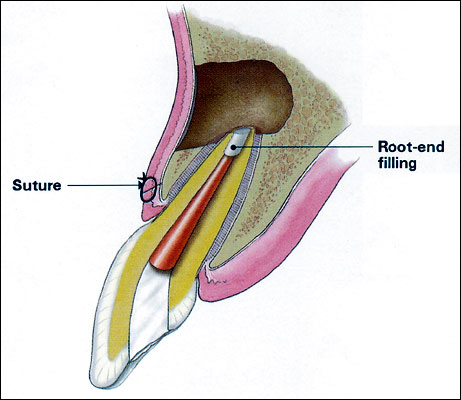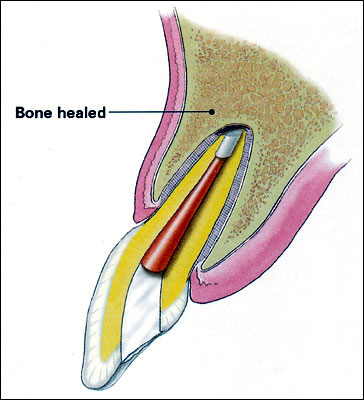Apicoectomy is the dental term for Endodontic surgery.
Why would I need an Apicoectomy?
To prevent tooth loss, root canal therapy is often all that is needed to save teeth with a diseased pulp. Occasionally, root canal therapy will not be sufficient to heal the tooth and your endodontist will recommend either revisional therapy or endodontic surgery. Endodontic surgery can be used to treat conditions that are inaccessible to conventional therapy. Damaged and/or infected root surfaces and the surrounding bone may also be treated with surgery. The most common surgery used to save damaged teeth is an apicoectomy or root-end resection.

What is an Apicoectomy?
An incision is made in the gum tissue to expose the root and surrounding inflamed tissue. The damaged tissue is removed along with the infected end of the root tip. A root-end filling is placed to seal the root canal and prevent re-infection of the root canal space. The gum tissue is then sutured back into place, allowing the bone to naturally heal around the root over a period of months restoring full function.
Following the procedure there may be some discomfort and/or swelling while the incision heals. This is normal for any surgical procedure. To alleviate any discomfort, an appropriate pain medication will be prescribed. If you have pain that does not respond to medication, please contact our office.
Who performs endodontic surgery?
All dentists received training in endodontic treatment in dental school. However, because endodontic surgery can be more challenging than providing nonsurgical treatment, many dentists refer patients needing surgery to endodontists. Endodontists are dentists with at least two additional years of advanced education and training in root canal techniques and procedures. In addition to treating routine cases, they are experts in performing complicated procedures including surgery. They often treat difficult cases-such as teeth with unusual or complex root structure or small, narrow canals. This special training and experience can be very valuable when endodontic surgery is necessary.
Why would I need endodontic surgery?
Surgery can help save your tooth in a variety of situations:
- Surgery may be used in diagnosis. If you have persistent symptoms but no problems appear on your x-ray, your tooth may have a tiny fracture or canal that could not be detected during nonsurgical treatment. In such a case, surgery allows your endodontist to examine the entire root of your tooth, find the problem, and provide treatment.
- Sometimes calcium deposits make a canal too narrow for the instruments used in nonsurgical root canal treatment to reach the end of the root. If your tooth has this “calcification,” your endodontist may perform endodontic surgery to clean and seal the remainder of the canal. Usually, a tooth that has undergone a root canal can last the rest of your life and never need further endodontic treatment. However, in a few cases, a tooth may not heal or become infected. A tooth may become painful or diseased months or even years after successful treatment. If this is true for you, surgery may help save your tooth.
- Surgery may also be performed to treat damaged root surfaces or surrounding bone, or aid the immune system in resolving an infection or problem outside the root canal.
- Although there are many surgical procedures that can be performed to save a tooth, the most common is called apicoectomy or root-end resection. When inflammation or infection persists in the bony area around the end of your tooth after a root canal procedure, your endodontist may have to perform an apicoectomy.
What is the Apicoectomy procedure like?
Removal of the very end of the root is called apicoectomy. In this procedure, Dr. Comer opens the gingival tissue near the tooth to examine the underlying bone and to remove any inflamed or infected tissue. A small filling may be placed in the root to seal the end of the root canal, and a few stitches or sutures are placed in the gingiva to help the tissue heal properly. Over a period of months, the bone heals around the end of the root.
Are there other types of endodontic surgery?
Other surgeries Dr. Comer might perform include dividing a tooth in half, repairing an injured root, or even removing one or more roots. Dr. Comer will be happy to discuss the specific type of surgery your tooth requires. In certain cases, a procedure called intentional replantation may be performed. In this procedure, a tooth is extracted, treated with an endodontic procedure while it is out of the mouth, and then replaced in its socket. Additionally, in some circumstances a procedure called an autotransplantation can be performed. A damaged tooth that cannot be saved is extracted and one of your natural teeth, such as a third molar, is used to replace the missing tooth. These procedures are designed to help you save your tooth.

Will the procedure hurt?
Local anesthetics make the procedure comfortable. Of course, you may feel some discomfort or experience slight swelling while the incision heals. This is normal for any surgical procedure. Dr. Comer will recommend appropriate pain medication to alleviate your discomfort. He will give you specific postoperative instructions to follow. If you have questions after your procedure, or if you have pain that does not respond to medication, call our office.
Can I drive myself home?
Often you can, but you should ask our staff before your appointment so that you can make transportation arrangements if necessary.
When can I return to my normal activities?
Most patients return to work or other routine activities the next day. Dr. Comer will be happy to discuss your expected recovery time with you.
Does insurance cover endodontic surgery?
Each insurance plan is different. Check with your employer or insurance company prior to treatment.
How do I know the surgery will be successful?
Your dentist or endodontist is suggesting endodontic surgery because he or she believes it is the best option for saving your own natural tooth. Of course, there are no guarantees with any surgical procedure. Dr. Comer will discuss your chances for success so that you can make an informed decision.

What are the alternatives to endodontic surgery?
Often, the only alternative to surgery is extraction of the tooth. The extracted tooth must then be replaced with an implant, bridge, or removable partial denture to restore chewing function and to prevent adjacent teeth from shifting. Because these alternatives require surgery or dental procedures on adjacent healthy teeth, endodontic surgery is usually the most biologic and cost-effective option for maintaining your oral health. No matter how effective modern artificial tooth replacements are—and they can be very effective—nothing is as good as a natural tooth. You’ve already made an investment in saving your tooth. The pay-off for choosing endodontic surgery could be a healthy, functioning natural tooth for the rest of your life.
Information on this procedure has been adopted from the copyrighted literary content of the American Association of Endodontics.